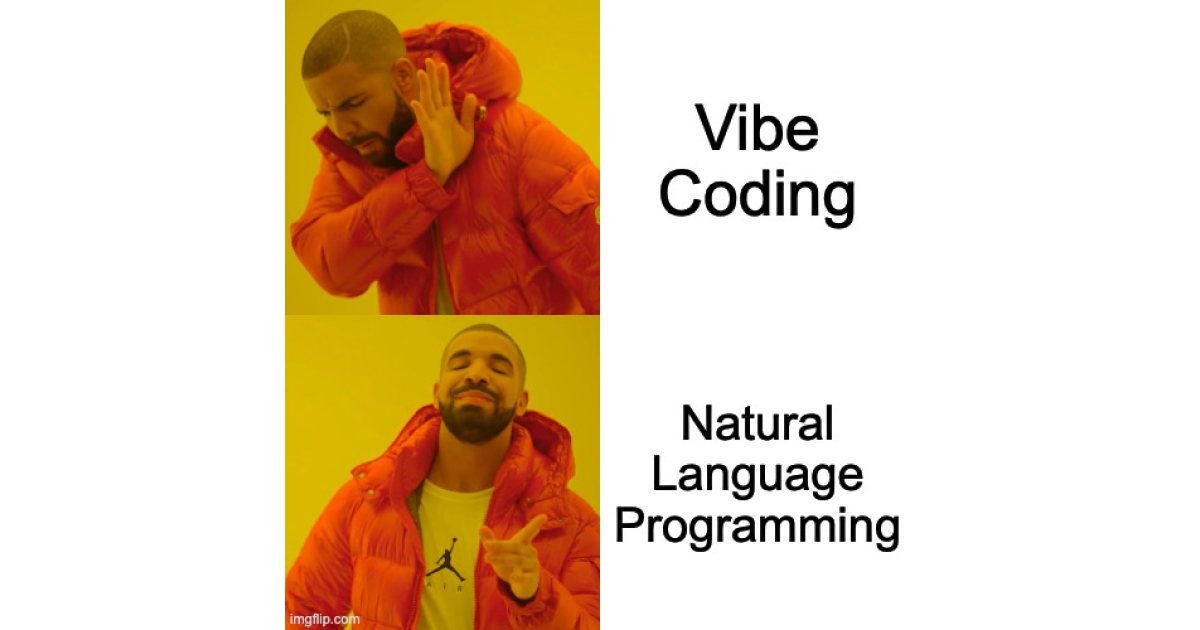
Natural Language Programming

Justin Hunter
In February of 2025, Andrej Karpathy—one of the founding members of OpenAI—put a name to the thing that many developers and non-developers had begun using AI for. That thing was using LLMs to generate code that builds entire sites and apps. And the name was “vibe coding”. The concept is important, but the name is unfortunate.
In the last year and a half, AI has evolved from being something people interact with in a chat window to something more embedded. This is especially true for developers with Microsoft’s implementation of Copilot, Cursor’s AI-native IDE, Bolt’s full stack AI-powered dev environment, and V0’s AI prototyping tool to name a few. These tools have not only empowered developers, they have given non-technical people the ability to create technical solutions based on prompts. This is what Andrej referred to as vibe coding—the process of generating something using AI based on vibes.
The advancement of AI’s capabilities to enable this is incredible. It gives everyone superpowers, something coding previously only gave to developers. It also frees developers up to work on harder problems. The problem is in the name. Vibe coding is condescending enough to create riffs. Experienced developers see the trend, they see the term, and some of them use this to look down upon the advancement. It’s not real coding. It will never be production ready. It’s bug-filled spaghetti code.
Some of these statements are true for some of the outputs. For now. And not all of the statements are true. In fact, I would argue that “vibe coding” is real coding. It’s more than real coding. It’s the future of code. But it’s been given a bad name from the jump.
Introducing Natural Language Programming
Natural Language Programming uses natural text that you and I might use to write an email or a text message or a project brief and it turns that natural language into code. Natural Language Programming leverages the incredible power of LLMs to convert words into code. It adjusts to errors and can self-correct as it builds.
Natural Language Programming allows developers to focus on architecture, logic, and design. But it’s not limited to developers. Natural Language Programming provides tools that allow designers and marketings and small business owners to launch things they otherwise would never have launched.
It’s a technological shift of progress. Fortunately, we have many examples across history to point to as inflection points for what’s happening today. Those examples, in their time, may have initially had bad names and may have been framed poorly. But today, we have distinct names for these things and they convey forward progress.
- The Renaissance
- The industrial revolution
- The computer revolution
- The internet revolution
Imagine if each of those movements had been branded as poorly as this Natural Language Programming movement is currently branded. We might have ended up with something like:
- Remixing (The Renaissance involved taking classical ideas and “remixing” them with new perspectives)
- Machine vibes (Factory owners could “give in to the machine vibes” and let mechanical processes handle what skilled artisans previously did by hand, without necessarily understanding the mechanics.)
- Button pushing (Just press the right buttons and let the computer do the thinking)
- Link thinking (The ability to connect information through hyperlinks without having to fully comprehend everything in between)
Fortunately, we understand the world-changing progress brought by each of the four revolutions mentioned. Would they have progressed as they did had they been given silly names like above? Probably. But it might have been harder.
The same is true with vibe coding. Natural Language Programming better captures what’s actually happening.
Everyone Will Be A Developer
This is especially important if you care about the web like I do. When I was young, building a website was hard. It took me forever to learn HTML and CSS. I survived on assists from Geocities, Angel Fire, and later from MySpace. But building apps and websites was a steep learning curve for me that took over 20 years.
That exists today still. Or it did before AI’s incredible progress. No-code solutions helped bridge the gap between the technical and the non-technical, but there were massive limitations. AI eliminates those limitations, effectively making everyone a developer.
And if everyone is a developer, we need to make sure everyone can host their creations easily. We need to make sure those creations are portable and can stand the test of time without the threat of vendor lock-in. That’s why Orbiter exists.
Orbiter is for the vibe coders.
Orbiter is for the Natural Language Programmers.
Orbiter is for the designers and marketers, the bloggers and TikTokers, the small business owners and the teachers.
Orbiter is for everyone because everyone is a developer now.
